TONY Martin is hard to pin down on Tuesday afternoon. Actually, it is possible he’s hard to pin down on any afternoon, or indeed any time in the day.
“Come up around 12.15 and we’ll have an aul cup of tea and you can ask me whatever,” he said on the phone the day before.
It was 2.15 until we sat down in his office but we will be all the more informed for it. It’s always an experience in Arodstown - Martin’s base just outside Summerhill, Co Meath.
He’s been a local to this area all his life. His father Jimmy threw his hand to nearly everything he possibly could but the two mares he kept at home made the biggest impression on his son, and so he has basically been training since he was 17. He can’t imagine any better way to have spent his life.

To his friends, inside racing and out, he’s known as Harvey. The name stuck after he began his riding career with Clem Magnier.
“I was only a kid in Magniers,” he recalls. “I used to work there on Saturdays and Sundays and there was a fella in England there called Harvey Smith and he used to be thrown up on all the rough ones.
“The boys would be giving me all the dodgy and rough ones in Magniers because I was young and eager, so that’s where it came from - ‘Throw Harvey up on that one.’”
It seems like that bit of madness never left him. It’s hard to keep him still, his mind always in overdrive. His cup of tea goes cold as he runs back out to the yard to issue a few instructions. Then we’re out to watch another lot. His phone rings, his door is knocked on and his name is called almost every two minutes, but it’s seemingly just a standard morning/afternoon.
There is a method to the madness here, because make no mistake, there aren’t many more horsemen as talented as Martin in this country. We’re talking here because after a quiet period, things have clicked for him again, and the height of the resurgence came at Cheltenham last week, when Good Time Jonny was delivered in perfect time by Liam McKenna to win the Pertemps Final.
It bridged a gap of eight years to his previous Festival win but it was his seventh in all, the likes of Xenophon, Benefficent and Ted Veale all providing great days at Prestbury Park. Outside of the Festival, Davids Lad, Northern Alliance, Leg Spinner, Thomas Edison, Laganore and Quick Jack are just some of the names that brought back riches from both codes.

Martin’s story of the last decade has a similar theme to so many Irish trainers - priced out of sourcing the necessary talent to compete at the highest level, but not through a deficiency in his own ability to train.
His output on the flat has increased but it’s a stark statistic that in the four National Hunt seasons starting from 2017-18, he had just 22 winners, a paltry return when you consider he sent out exactly double that amount in just the 2014-15 season.
“Sure look, we had a few aul issues around the place, things went wrong in different ways but touch wood, we just got on top of things and had a bit of luck,” Martin reflects. “But even through the lean years we still had Anibale Fly running second in Gold Cups and we won Galway Hurdles.
“We just happened to be out of luck with different things and a few horses went wrong, so we just didn’t have the better ones to represent us. Losing the likes of Heartbreak City and Bog Warrior - that’s just bad luck.

“It’s hard to take of course but you look over your shoulder and you see what Henry de Bromhead and his family have gone through and you see the likes of John Shortt and Tommy McGivern not there any more, and you quickly see there are more important things going on outside of racing.”
It was very noticeable that de Bromhead was one of the first to congratulate Martin in the Cheltenham parade ring last week, meeting him with a warm hug and general delight it has success.
“Henry is one of the few people I’d have a lot of time and respect for, even prior to the terrible tragedy he has gone through,” Martin asserts. “We have a bit of deep friendship since that. He has always been good to me and we’ve got on well. I might not be up hugging and kissing him after he’s had a winner but maybe a few days later, I’ll always be talking to him, happy for him.
“Obviously what happened to him gives you a perspective against the bad days but look don’t get me wrong either, it’s a fair knife to the back losing any horse. I always go back to Bog Warrior. He’s the best horse I’ve ever had anything to do with, never mind train, and I looked after and rode out The West’s Awake the year he won the Sun Alliance for Oliver Sherwood, For Auction and a good few others.

“I know how good he could have been. He won the Drinmore by a distance. It just went the wrong way for him and you have to accept that in racing, luck is so important to you. What Henry has done with Honeysuckle, getting her to the Festival to win four times, what Willie did with Quevega, Henrietta Knight with Best Mate - those achievements are just exceptional.
“It’s underappreciated in this game, just getting horses to produce their best time and time again - it’s an unbelievable skill, a great, great training performance.”
Ability
Martin has that ability as well - Tudor City’s two wins, three years apart in a Galway Hurdle is testament to him. He has never lost his reputation for readying one for the big day and everyone knows it.
When Good Time Jonny won the three-mile Grade B handicap hurdle at the Dublin Racing Festival last year, he knew he had a Cheltenham horse and that belief was vindicated.
It was intriguing to read one of the part owners Aidan ‘Red’ Shiels in these pages last week reveal just how detailed Martin’s instructions were to jockey Liam McKenna. He had mapped the race out for him to an absolute tee.
There is a plaque on the wall of his office that has a newspaper cutting report of Dun Doire’s famous win in the William Hill Handicap Chase (now Ultima) - the last Irish-trained horse to win that contest.
Like Good Time Jonny, the report tells of how Dun Doire came from what appeared to be a hopeless position to win more than a shade comfortably in the end. Martin is quoted in the report praising the patience of Ruby Walsh, who much the way he did the same for McKenna last week, followed the instructions laid out by the trainer.
He has always placed a huge emphasis on riding tactics.
“People have this thing of me wanting horses ridden out the back, it’s a load of rubbish, I can’t have that at all,” he says. “You ride the horse where it needs to be ridden. Good Time Jonny is a slow horse, he’s like Dun Doire, but Xenophon or Bog Warrior, you could ride them in the first two or three.
“It’s usually the same idea - if the horse needs a chance or he’s a bit slow, don’t puncture him, or if a horse has a bit of speed and turn of foot, have him up with the pace. I like watching rugby but I don’t think anyone should listen to my opinion about rugby because I never played it. Once you’ve rode a winner or two, you don’t have to be champion jockey, you know what it’s about and you’re entitled to talk.
“The thing about Liam is that he’ll listen. You make a plan and he’ll try and follow it. If it doesn’t work, he has to think on his feet but that’s fine. The best thing about his ride on Good Time Jonny last week is that he didn’t put him on his head at any stage, a lot of lads would have panicked, hit the horse a couple of slaps and said ‘come on get closer’, and punctured him and left nothing to come home with.
“I think Liam is alongside (Michael) O’Sullivan, (Ben) Harvey and (John) Gleeson last week as the next batch of riders coming through who could get into the category of the likes of Russell, Walsh, Carberry - all those brilliant riders.
“I’ve Peterjon Carberry here as well and he’s a very good rider over a jump, a typical Carberry. The pair of them ride most of mine. Sometimes you think you’d like to have one of the big name jockeys on but you have to be loyal to these lads who’ve shown a lot of loyalty to me.”

Loyalty
Loyalty is key all round. A common conception in racing is that when a trainer delivers a big result, it can pave the way for new clients with new horses. Martin has never thought like that.
If it happens great, but the goal has always been to repay the faith shown in him by his current owners, such as John Breslin (Ted Veale, Quick Jack, Tudor City), J.P. McManus (Thomas Edison, Anibale Fly), Maurice Regan (Laganore) and the New York-based trio of Shiels, Niall Reilly and Charlie Gavigan (Good Time Jonny, Benefficent and Heartbreak City).
Sourcing the horses for these owners is three quarters of the battle and there is no set formula of rocking up to the same couple of sales every year. Heartbreak City was bought out of a French claiming race having finished fifth. Anibale Fly was bought at a breeze-up sale in Deauville. Benefficient was bought out of Cork trainer Debbie Hartnett’s yard, Good Time Jonny was bought out of John McConnell’s.
“It always depends on the budget you have,” Martin explains. “It’s obviously hard to go and compete at a Derby or Land Rover Sale now but all you can do is your best and try and source one or two yourself privately, be it in Ireland, England or France.
“It can be hard to buy a horse privately because you’re more or less approaching people for horses that aren’t necessarily for sale and a lot of the times people will want a lot more money than you’d be willing to pay. You have to make that call but I’ve been lucky and I’ve a few good fellas behind me.
“Pete Davies has come on board with me and gave me an order to buy a couple so we have a couple of nice ones for him now and all you want is for them to work out. Again, it’s the bit of luck you need the most.”
Especially in Ireland, where the bar on both the National Hunt and flat scenes is constantly edging upwards. It’s a facet he embraces rather than begrudges.
“Everyone has good facilities now, so there is no bother getting horses fit and everyone can get them to a stage,” Martin explains. “There’s so many good gallops within an hour of everyone. you can bring them to the Curragh, or wherever you have to go just to fine tune them to leave them where you want.
“The standard is so high because racing in this country is in our heritage and so many people can turn their hand to a horse. So many have great knowledge and great skills with horses - it’s a natural thing.

“You see a lot of other countries where horses probably aren’t as much in their heritage. I just think that’s made a difference, Irish people have a lovely, gentle way with horses, their nature is to be part of the horse, any type of horse. That has brought us to where we are in the world today.”
Martin is holding his own again. If he was able to win Galway Hurdles and have a horse placed in Gold Cups when he was going through his lean years, Good Time Jonny’s Festival win could be a sign of things to come now that he has decent numbers again.
“We’re out over 40 here, which is great,” he says. “It’s just getting the staff for them is the thing you’d wish for. We’ve great people here who work hard but you could do with a few more in.
“With the horses, of course you’re always looking for a couple of more quality ones, that Grade 1 type of horse, it would be lovely to unearth another one. Good Time Jonny is probably a top class handicapper but we’ll see how he gets on at one of the spring festivals.
“But we are doing well again numbers wise. I’d say the most we ever had riding out here was 50. We’d have room for 70 and we’re often full but you’ll have a few that won’t be riding out for whatever reason.
“Look, days like last week make the difference, they give you the lift. You get the buzz and you get the feeling, just before it, when you have one that has a live chance and you’re giving it a live chance, you get butterflies, and you’re watching the race and you’re riding every jump with your jockey.
“That’s what it’s all about.”
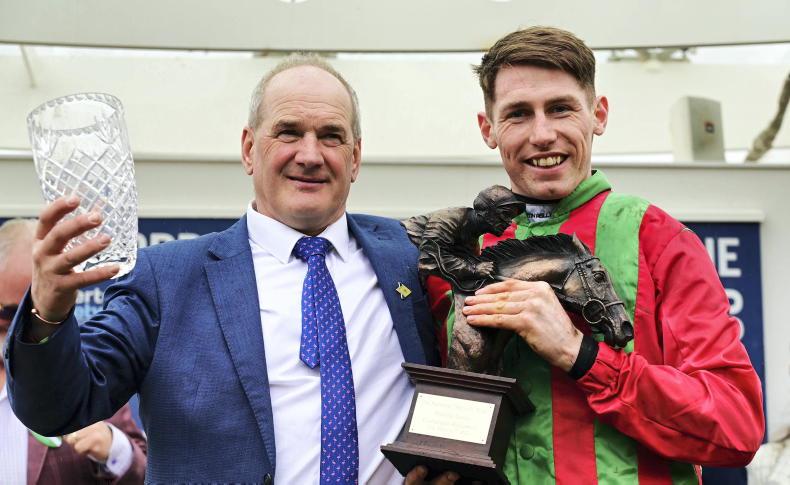

 This is a subscriber-only article
This is a subscriber-only article
 It looks like you're browsing in private mode
It looks like you're browsing in private mode




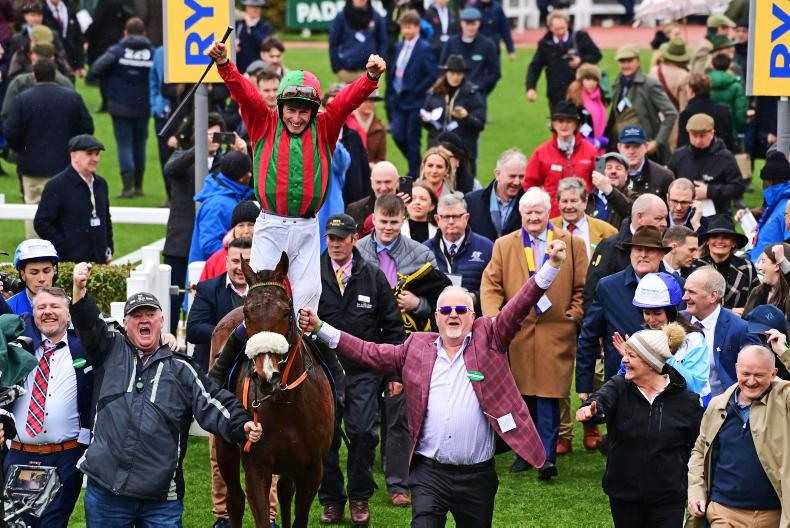
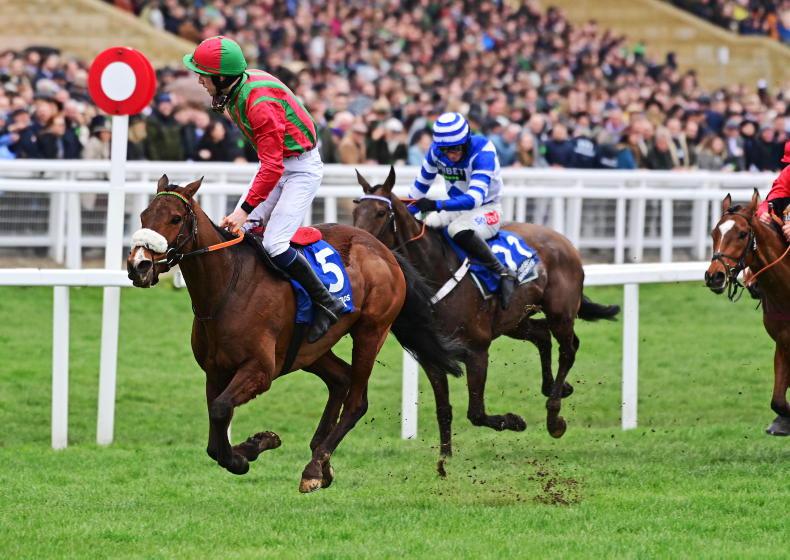
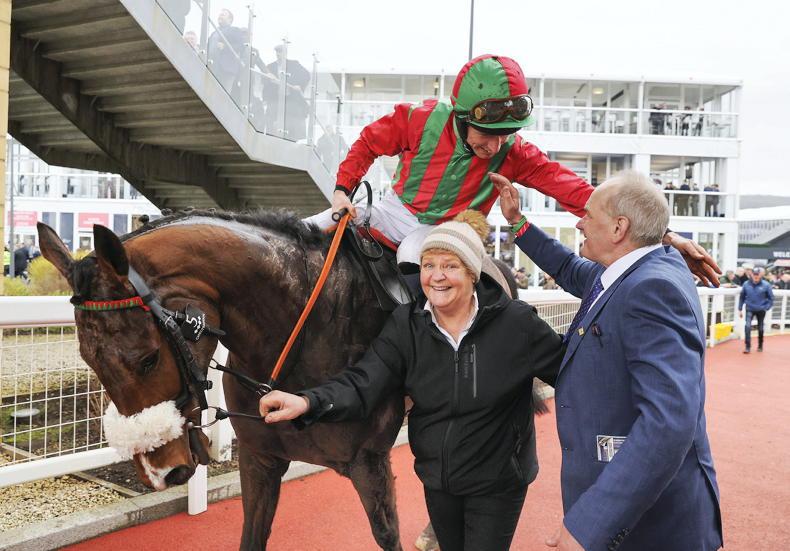
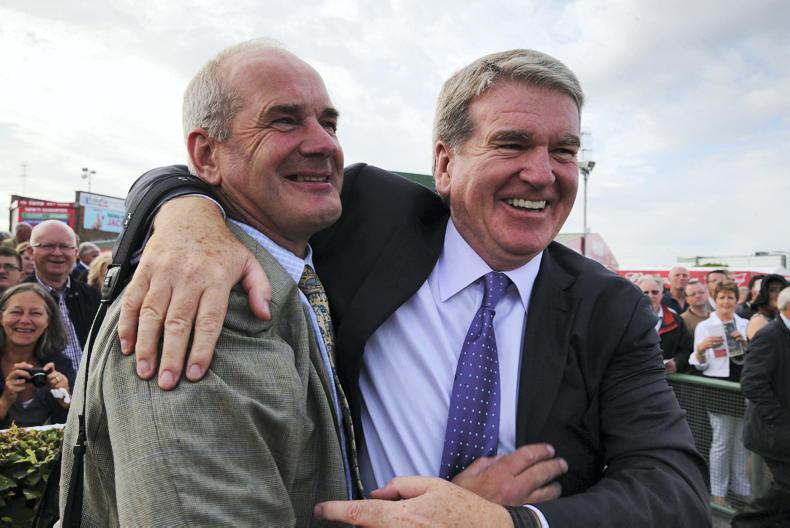
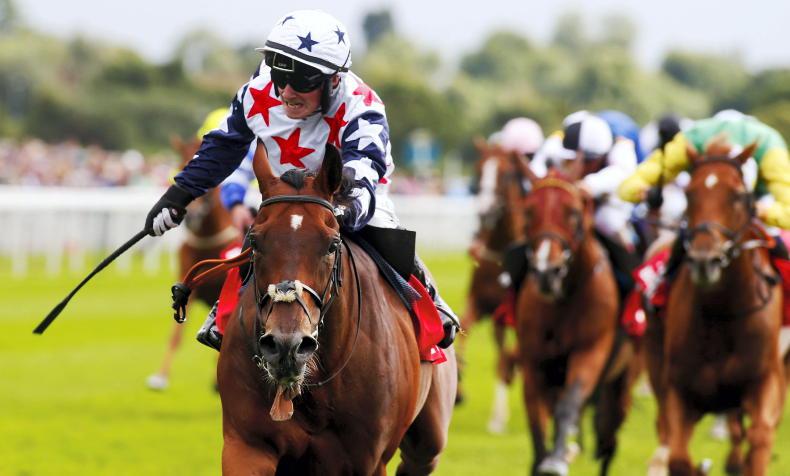



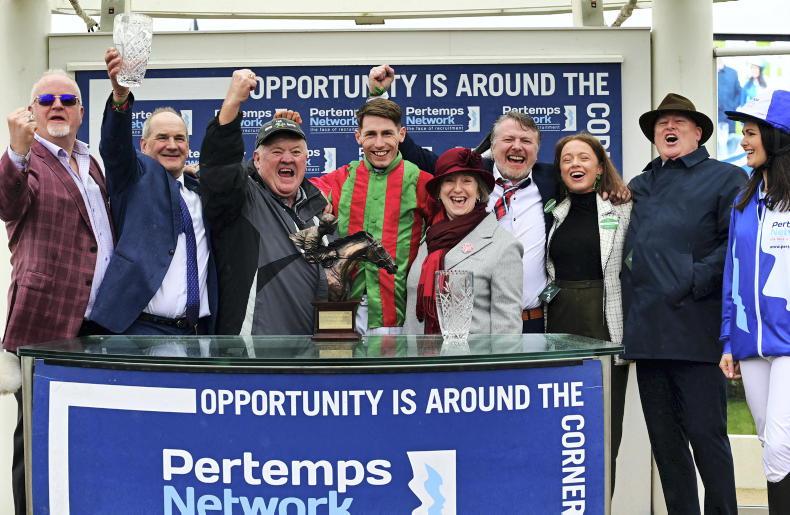
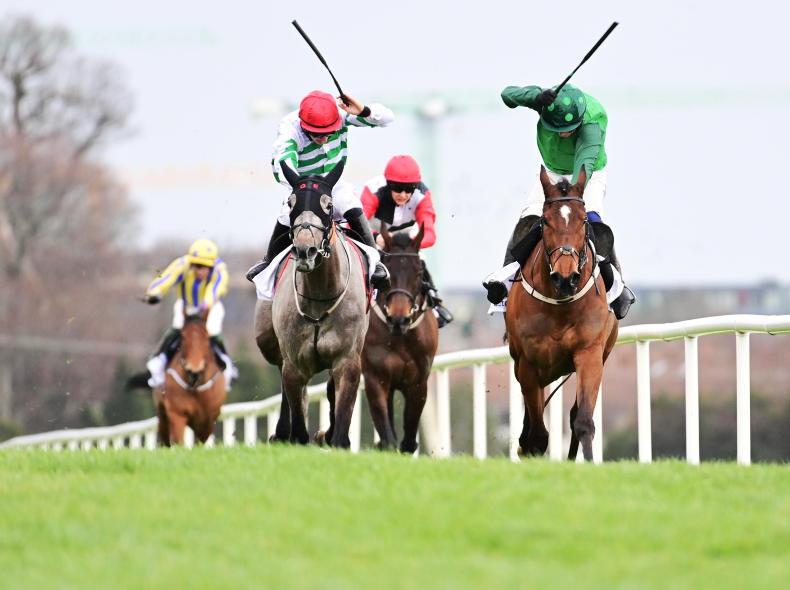
SHARING OPTIONS: